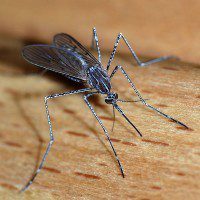 Melting snow and April showers in Saint Cloud equals a lot of water puddles, which unfortunately is a mosquito’s heaven and breeding ground. Mosquitoes do more than irritate us when they bite; they can also be spreading diseases!!
Melting snow and April showers in Saint Cloud equals a lot of water puddles, which unfortunately is a mosquito’s heaven and breeding ground. Mosquitoes do more than irritate us when they bite; they can also be spreading diseases!!
One of the diseases that mosquitoes spread among our dogs and cats is heartworm disease.
Heartworms are worms, about 4-6 inches in length, that live in the major blood vessels of the heart and lungs. They obstruct blood flow and damage the vessels, making it hard for the heart and lungs to do their job.
Symptoms vary with each pet. Early on there may be no outward signs. Later they can have appetite changes, vomiting, poor hair coat, coughing, and tire more easily. Dogs with a more prolonged disease or a lot of worms may collapse during or after exercise; some may die. Cats can show similar signs, but sometimes the only symptom is sudden death.
So where does the mosquito fit into this and how can we prevent this deadly disease?
A heartworm positive animal has baby heartworms (larvae or microfilaria) circulating in the blood. When a mosquito takes a blood meal, they suck up some of the larvae too. Then, when they eat again (different pet) they inject the larvae into that pet with their saliva. The larvae migrate through the tissue, maturing as they do, until they reach the blood vessels.
Large dogs can have 100’s of worms. Smaller dogs have fewer worms and cats can have only a few worms but still have major symptoms.
So what can you do?
- Keep stagnant water to a minimum around your property to eliminate breeding grounds.
- Protect your pet: You could wrap your pet in mosquito netting 24/7, but that would not be very practical or cuddly. Insect repellents are not always 100 % effective. Talk to your veterinarian. There are many effective preventative medications available (they kill the larvae before it can mature into an adult). Some are oral, others are topical. Most are given once every 30 days.
- Be very consistent in giving medications; missing even by a few days can open up the window for a few (or more) larvae to grow into adult worms.
- Give year round, yes, even in MN. It is the best way to make sure you kill all the larvae or baby heartworms. If you insist on doing seasonal prevention, remember you MUST give it TWO months PAST the last mosquito to be effective in killing all larval stages!
The team @ Companions will help you decide which preventive is the best choice for you and your pet.
For more information on heartworms and other kinds of worms check out…












